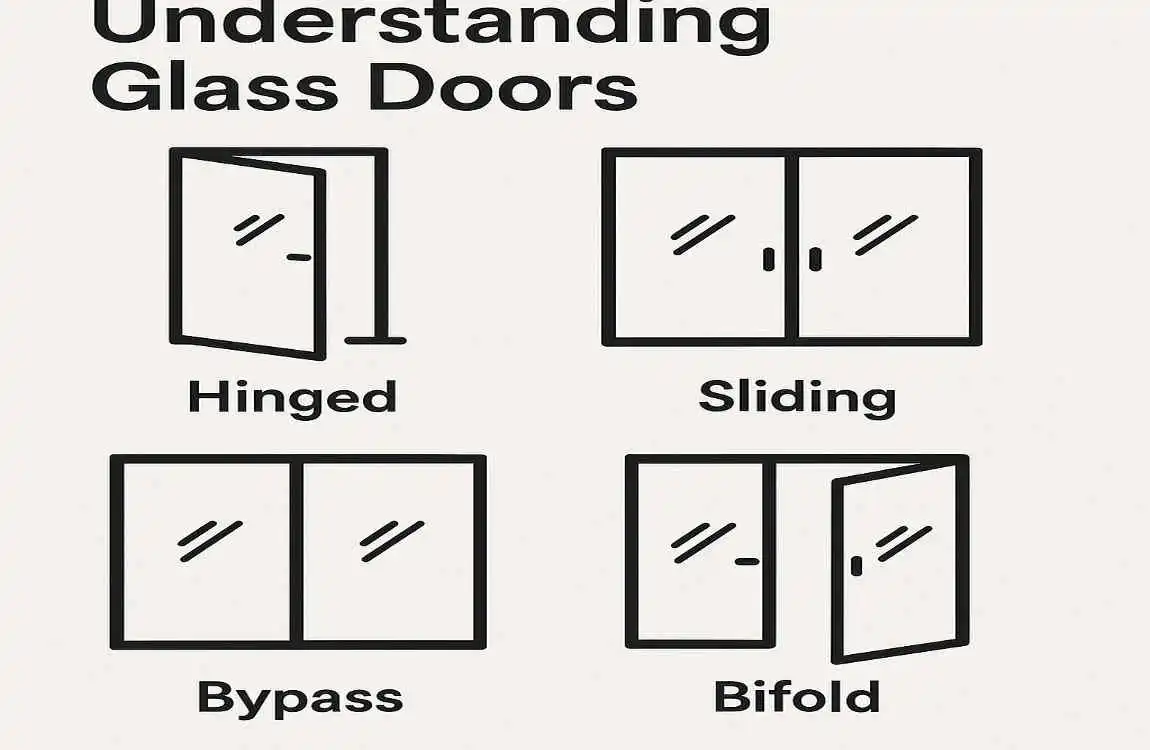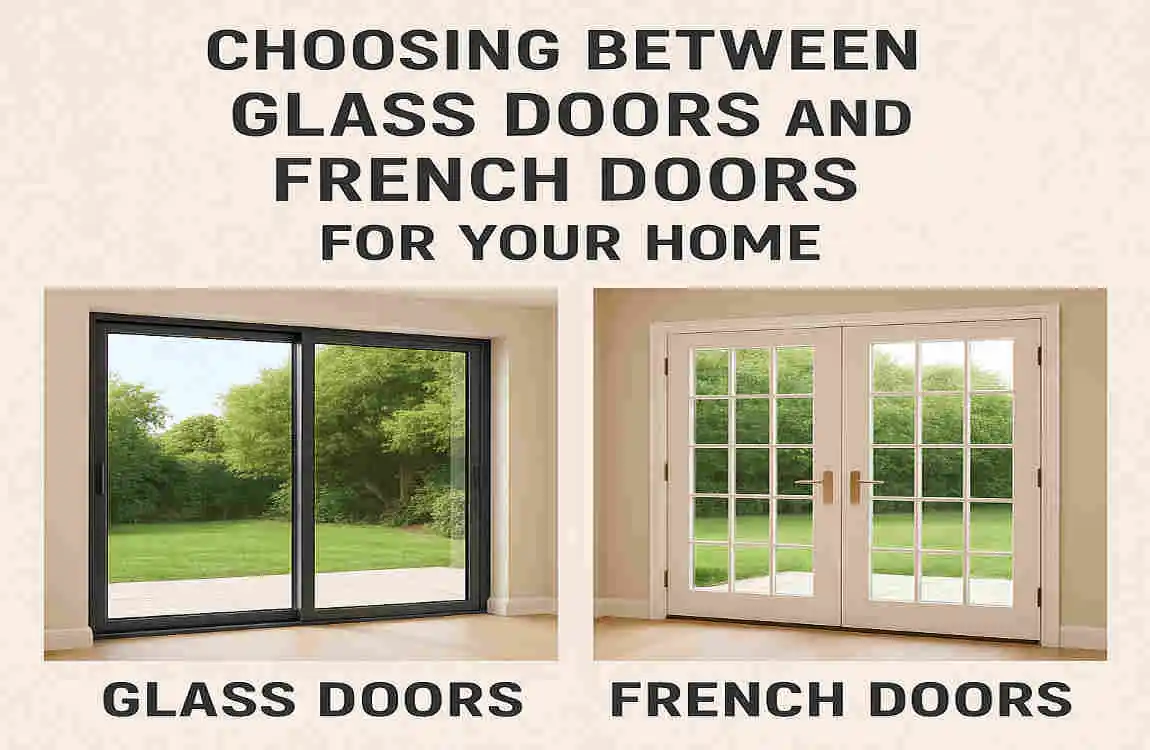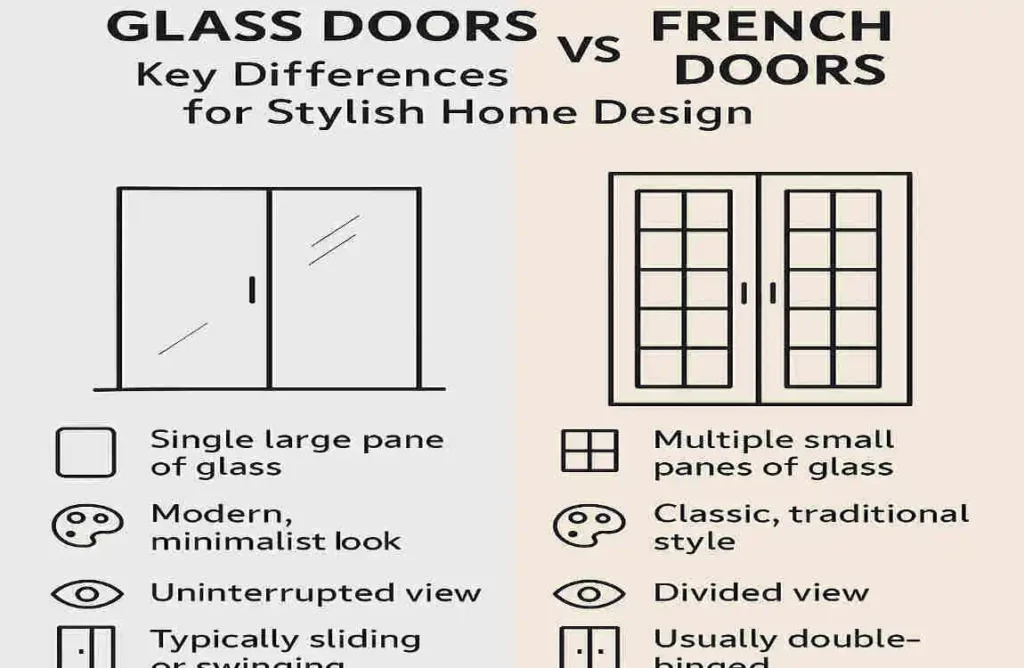Are you thinking about upgrading your home with new doors? The choice between glass and French doors can significantly impact your home’s aesthetics, functionality, and lighting. Both types of doors are popular choices for modern, stylish homes, but what is the difference between a glass door and a French door?
Understanding Glass Doors

Definition and Basic Characteristics
When we talk about glass doors in residential design, we usually mean doors with large glass panels and a frame. These doors come in various types, including sliding, hinged, folding, and pivot doors. The frames are typically made from materials like aluminum, wood, or uPVC, with glass panels filling most of the space.
Design Styles and Use Cases
Glass doors offer a range of popular designs, such as full glass panels, frosted, tinted, or etched glass. They are commonly used in patios, balconies, sunrooms, and even commercial spaces. One of the main benefits of glass doors is that they maximize natural light, creating a seamless transition between indoor and outdoor spaces while giving the illusion of more space.
Advantages of Glass Doors
- Maximizes natural light: With large glass panels and glass doors, more sunlight enters your home, brightening your living spaces.
- Creates a seamless indoor-outdoor transition: Glass doors blur the lines between inside and outside, making your home feel more connected to nature.
- Modern and minimalist aesthetic: The clean lines and minimal framing of glass doors give your home a contemporary, stylish look.
- Energy-efficient options: Glass doors with double or triple glazing can help keep your home warm in winter and cool in summer, reducing your energy bills.
Disadvantages of Glass Doors
- Privacy concerns: With so much glass, maintaining privacy can be challenging, especially in areas facing the street or neighbors.
- Safety and security considerations: While modern glass doors are made with safety glass, they may not provide the same level of security as solid doors.
- Maintenance and cleaning requirements: Glass doors require regular cleaning to keep them looking their best, and the frames may need occasional maintenance.
- Cost factors: High-quality glass doors can be more expensive than traditional doors, especially if you opt for energy-efficient glazing.
Understanding French Doors
Definition and Typical Features
French doors are usually a pair of hinged doors with multiple small glass panes separated by muntins (thin strips of wood or metal). They have a long history, dating back to the 17th century in France, where they were used to bring more light into homes. French doors are typically made from wood, fiberglass, or aluminum.
Design Characteristics and Variations
The classic style of French doors features a grid or paneled glass design. However, you can customize them with full-glass, divided-light, or decorative glass. French doors are versatile and can be used for entryways, interior room dividers, or patio doors.
Advantages of French Doors
- Elegant, traditional aesthetic: French doors add a touch of classic elegance to any home, enhancing its timeless appeal.
- Enhances classic, timeless home designs: If you have a traditional or historic home, French doors can help preserve its character and charm.
- Improved air circulation when open: The hinged design of French doors allows for better air flow when they’re open, keeping your home fresh and comfortable.
- Versatile for interior and exterior use: French doors can separate rooms or connect your home to the outdoors, making them an adaptable choice.
Disadvantages of French Doors
- More complex maintenance due to grids: The muntins in French doors can make them more challenging to clean and maintain than glass doors.
- Space needed for door swing: Hinged doors require more space to open and close, which can be a consideration in smaller rooms or tight spaces.
- Potentially higher energy loss due to multiple glass sections: The divided glass panes in French doors may result in greater heat loss or gain than with glass doors with larger panels.
- May be costlier than standard glass doors: Depending on the materials and customization, French doors can be more expensive than basic glass doors.
Key Differences Between Glass Doors and French Doors
Focus Keyword Section: What is the difference between a glass door and a French door?
So, what is the difference between a glass door and a French door? Let’s break it down:
- Structural differences: Glass doors typically have large, uninterrupted glass panels, while French doors feature multiple smaller panes separated by muntins.
- Style and visual impact differences: Glass doors have a modern, minimalist look, while French doors offer a classic, elegant aesthetic.
- Functional contrasts: Glass doors often come in sliding, folding, or pivot options, while French doors are hinged and swing open.
- Differences in privacy, natural light diffusion, ventilation, and security: Glass doors may offer less privacy but more light, while French doors provide better ventilation but may be less secure.
- Material and maintenance differences: Glass doors often have simpler frames, while French doors may require more maintenance due to their muntins.
How each type fits into various design aesthetics
- Modern and contemporary homes: Glass doors are a natural fit, with their clean lines and minimalist design.
- Traditional, rustic, and classic homes: French doors complement these styles, enhancing their timeless appeal.
- Transitional and eclectic styles: Both glass and French doors can work well in transitional or eclectic homes, depending on the specific design elements.
Size and spatial considerations
- Space requirements for door operation: Glass doors, especially sliding or folding types, require less space to operate than hinged French doors.
- Impact on room layout and furniture placement: The choice between glass and French doors can affect how you arrange your furniture and navigate your space.
Choosing Between Glass Doors and French Doors for Your Home

Assessing Your Home’s Architectural Style
When deciding between glass doors and French doors, consider your home’s architectural style. Glass doors may be a better fit for modern or contemporary homes. In contrast, French doors can enhance the charm of traditional or historic properties. Think about how the doors will complement your home’s façade and interior design scheme.
Comparing Functionality Needs
- Natural light needs vs privacy: If maximizing natural light is a priority, glass doors may be the way to go. However, if privacy is more important, French doors with smaller panes or decorative glass might be a better choice.
- Ventilation preferences: French doors can provide better air circulation when open, making them ideal for areas where you want to encourage airflow.
- Indoor-outdoor flow requirements: Glass doors, especially sliding or folding types, can create a seamless transition between indoor and outdoor spaces, making them ideal for homes with patios or decks.
Energy Efficiency and security Factors
- Glass types, glazing options, and hardware quality: Both glass and French doors can be energy-efficient, but the kind of glass, glazing, and hardware used can make a big difference. Look for doors with double- or triple-glazing and high-quality hardware for the best performance.
- Security features specific to each door type: Glass doors may require additional security measures, such as reinforced glass or security films. In contrast, French doors may benefit from multi-point locking systems.
Budget and Maintenance Considerations
- Cost comparison (installation, materials, upkeep): Glass doors can be more affordable than French doors, especially if you opt for basic designs. However, high-end glass doors with energy-efficient glazing can be more expensive. French doors may require more maintenance due to their muntins and hinges.
- Long-term durability and maintenance tips: Both glass and French doors can be durable with proper care. Regular cleaning, lubrication of hinges, and periodic checks of the weatherstripping can help extend the life of your doors.
Styling Tips and Installation Considerations
Enhancing Your Home’s Curb Appeal
- Complementary hardware choices: Choose door hardware that complements your home’s style and color scheme, such as sleek, modern handles for glass doors or ornate, traditional knobs for French doors.
- Color and finish options: Select door colors and finishes that enhance your home’s exterior, such as bold, contemporary hues for glass doors or classic, timeless shades for French doors.
- Matching door styles with surrounding windows and exterior decor: Ensure that your new doors harmonize with your home’s existing windows and exterior features for a cohesive look.
Interior Styling with Doors
- Using French doors to create intimate, connected spaces: French doors can separate rooms while maintaining a sense of connection and flow, making them ideal for creating cozy, inviting spaces.
- Using glass doors to maximize openness and brightness: Glass doors can help open up your home, making it feel more spacious and airy, especially in areas like kitchens or living rooms.
Installation Best Practices
- Professional installation essentials: For the best results, consider hiring a professional to install your new doors, ensuring proper fitting, sealing, and alignment.
- Measuring and fitting tips: Take accurate measurements of your door openings and choose doors that fit snugly, leaving minimal gaps for air leaks or security concerns.
- Weatherproofing and sealing for durability: Proper weatherstripping and sealing around your doors can help prevent drafts, water damage, and energy loss, extending their lifespan.
Popular Trends and Innovations in Glass and French Doors
- Innovative glass technology and privacy films for glass doors: New technologies allow glass doors to switch from transparent to opaque at the touch of a button, offering privacy on demand.
- Modern French door variations with minimalist muntins: Contemporary French doors feature thinner, less obtrusive muntins, giving them a more modern look while maintaining their classic charm.
- Eco-friendly materials and finishes: Both glass and French doors are now available in eco-friendly materials and finishes, such as sustainably sourced wood or low-VOC paints.
- Integration with smart home security and automation systems: Many modern doors can be integrated with smart home systems, allowing you to control locks, lighting, and even window treatments with your voice or a smartphone app.
